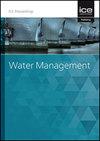Water Surface Profile Prediction in Compound Channels with Vegetated Floodplains
IF 1.1
4区 工程技术
Q3 ENGINEERING, CIVIL
Proceedings of the Institution of Civil Engineers-Water Management
Pub Date : 2022-01-24
DOI:10.1680/jwama.21.00005
引用次数: 1
Abstract
In the present decade, floods have been among the most dangerous and frequent natural disasters.Most rivers are characterized by compound cross-sections that are usually covered with vegetation. The ability to simulate water surface profiles in vegetated rivers quickly and accurately is crucial in flood forecasting operations. This study aims to introduce a low-cost and practical tool for predicting the water surface profile in compound channels with vegetated floodplains. In particular, the current paper employs the Artificial Neural Network (ANN) and Support Vector Machine (SVM) techniques to develop a model for the prediction of the water surface profile in an experimental channel. For this purpose, two approaches were employed. The first one was based on utilizing non-dimensional data, while the second one used dimensional data.The performances of the prediction methods were determined via a 10-fold cross-validation approach. The comparative results revealed that the SVM algorithm outperformed the ANN and regression models.The performance of the SVM model induced by the dimensional data with a CC of 0.99±0.005 and an MAE of 0.0019±0.0002 was shown to be marginally better than that for the dimensionless data. The sensitivity analysis results also indicated that the relative discharge and relative depth played the most important role in estimating the water surface profile.植被泛滥平原复合河道水面剖面预测
近十年来,洪水已成为最危险、最频繁的自然灾害之一。大多数河流的特点是通常被植被覆盖的复合断面。在洪水预报中,快速准确地模拟植被河流的水面剖面是至关重要的。本研究旨在提供一种低成本、实用的预测植被泛滥平原复合河道水面剖面的工具。特别地,本文采用人工神经网络(ANN)和支持向量机(SVM)技术开发了一个模型,用于预测实验通道的水面剖面。为此,采用了两种方法。第一种方法是利用无量纲数据,第二种方法是利用量纲数据。通过10倍交叉验证方法确定预测方法的性能。对比结果表明,SVM算法优于人工神经网络和回归模型。在CC为0.99±0.005,MAE为0.0019±0.0002的情况下,有量纲数据诱导的SVM模型的性能略好于无量纲数据。敏感性分析结果还表明,相对流量和相对深度在估算水面剖面中起着最重要的作用。
本文章由计算机程序翻译,如有差异,请以英文原文为准。
求助全文
约1分钟内获得全文
求助全文
来源期刊
CiteScore
2.10
自引率
0.00%
发文量
28
审稿时长
6-12 weeks
期刊介绍:
Water Management publishes papers on all aspects of water treatment, water supply, river, wetland and catchment management, inland waterways and urban regeneration.
Topics covered: applied fluid dynamics and water (including supply, treatment and sewerage) and river engineering; together with the increasingly important fields of wetland and catchment management, groundwater and contaminated land, waterfront development and urban regeneration. The scope also covers hydroinformatics tools, risk and uncertainty methods, as well as environmental, social and economic issues relating to sustainable development.

 求助内容:
求助内容: 应助结果提醒方式:
应助结果提醒方式:


